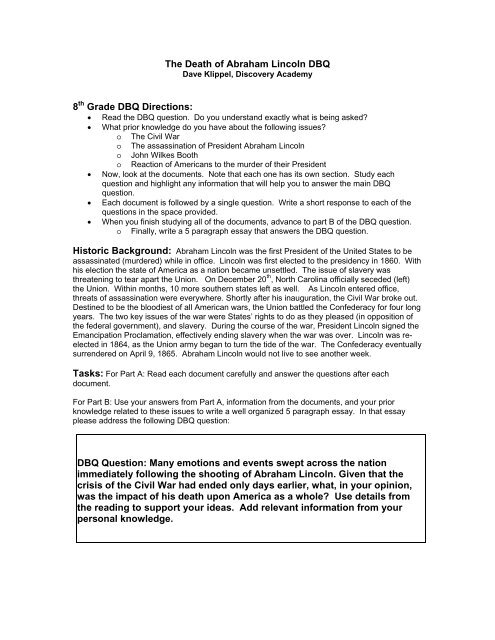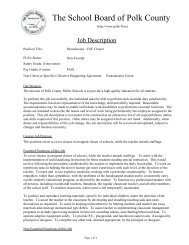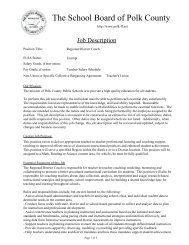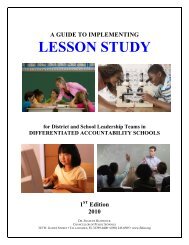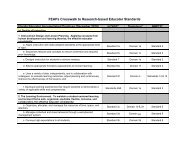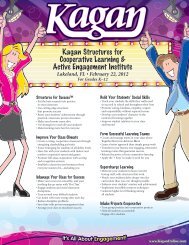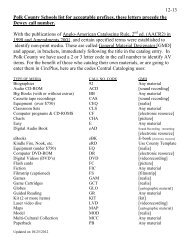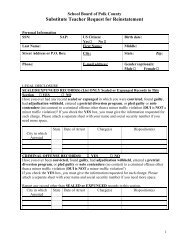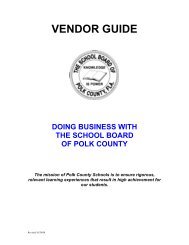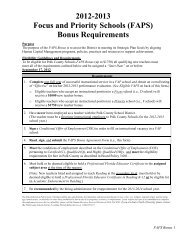The Death of Abraham Lincoln DBQ 8th Grade DBQ Directions: DBQ ...
The Death of Abraham Lincoln DBQ 8th Grade DBQ Directions: DBQ ...
The Death of Abraham Lincoln DBQ 8th Grade DBQ Directions: DBQ ...
Create successful ePaper yourself
Turn your PDF publications into a flip-book with our unique Google optimized e-Paper software.
<strong>The</strong> <strong>Death</strong> <strong>of</strong> <strong>Abraham</strong> <strong>Lincoln</strong> <strong>DBQ</strong><br />
Dave Klippel, Discovery Academy<br />
8 th <strong>Grade</strong> <strong>DBQ</strong> <strong>Directions</strong>:<br />
• Read the <strong>DBQ</strong> question. Do you understand exactly what is being asked?<br />
• What prior knowledge do you have about the following issues?<br />
o <strong>The</strong> Civil War<br />
o <strong>The</strong> assassination <strong>of</strong> President <strong>Abraham</strong> <strong>Lincoln</strong><br />
o John Wilkes Booth<br />
o Reaction <strong>of</strong> Americans to the murder <strong>of</strong> their President<br />
• Now, look at the documents. Note that each one has its own section. Study each<br />
question and highlight any information that will help you to answer the main <strong>DBQ</strong><br />
question.<br />
• Each document is followed by a single question. Write a short response to each <strong>of</strong> the<br />
questions in the space provided.<br />
• When you finish studying all <strong>of</strong> the documents, advance to part B <strong>of</strong> the <strong>DBQ</strong> question.<br />
o Finally, write a 5 paragraph essay that answers the <strong>DBQ</strong> question.<br />
Historic Background: <strong>Abraham</strong> <strong>Lincoln</strong> was the first President <strong>of</strong> the United States to be<br />
assassinated (murdered) while in <strong>of</strong>fice. <strong>Lincoln</strong> was first elected to the presidency in 1860. With<br />
his election the state <strong>of</strong> America as a nation became unsettled. <strong>The</strong> issue <strong>of</strong> slavery was<br />
threatening to tear apart the Union. On December 20 th , North Carolina <strong>of</strong>ficially seceded (left)<br />
the Union. Within months, 10 more southern states left as well. As <strong>Lincoln</strong> entered <strong>of</strong>fice,<br />
threats <strong>of</strong> assassination were everywhere. Shortly after his inauguration, the Civil War broke out.<br />
Destined to be the bloodiest <strong>of</strong> all American wars, the Union battled the Confederacy for four long<br />
years. <strong>The</strong> two key issues <strong>of</strong> the war were States’ rights to do as they pleased (in opposition <strong>of</strong><br />
the federal government), and slavery. During the course <strong>of</strong> the war, President <strong>Lincoln</strong> signed the<br />
Emancipation Proclamation, effectively ending slavery when the war was over. <strong>Lincoln</strong> was reelected<br />
in 1864, as the Union army began to turn the tide <strong>of</strong> the war. <strong>The</strong> Confederacy eventually<br />
surrendered on April 9, 1865. <strong>Abraham</strong> <strong>Lincoln</strong> would not live to see another week.<br />
Tasks: For Part A: Read each document carefully and answer the questions after each<br />
document.<br />
For Part B: Use your answers from Part A, information from the documents, and your prior<br />
knowledge related to these issues to write a well organized 5 paragraph essay. In that essay<br />
please address the following <strong>DBQ</strong> question:<br />
<strong>DBQ</strong> Question: Many emotions and events swept across the nation<br />
immediately following the shooting <strong>of</strong> <strong>Abraham</strong> <strong>Lincoln</strong>. Given that the<br />
crisis <strong>of</strong> the Civil War had ended only days earlier, what, in your opinion,<br />
was the impact <strong>of</strong> his death upon America as a whole? Use details from<br />
the reading to support your ideas. Add relevant information from your<br />
personal knowledge.
Part A<br />
Document 1: On the evening <strong>of</strong> April 14, 1865 <strong>Abraham</strong> <strong>Lincoln</strong>, his wife Mary, and another<br />
couple, Major Henry Rathbone and his future wife, Miss Clara Harris, attended a play at Ford’s<br />
<strong>The</strong>atre in Washington, D.C. <strong>The</strong> group sat in a private balcony box 11 feet above and to the<br />
right <strong>of</strong> the stage.<br />
John Wilkes Booth, a very famous stage actor <strong>of</strong> that time, had learned earlier in the day that the<br />
President would be attending that night’s play. Booth was a southern sympathizer with a deepseated<br />
hatred for all that <strong>Lincoln</strong> had accomplished. He and a small group <strong>of</strong> friends had weeks<br />
earlier planned to kidnap the President, but never got the chance. After the war had ended,<br />
avenging the south by murdering <strong>Lincoln</strong> was Booth’s primary motive.<br />
At about 10pm, as the play was winding down, Booth entered the President’s well-decorated<br />
balcony box. Clara Harris gave the following statement about what occurred next.<br />
“Major Rathbone arose and asked the intruder his business. He rushed<br />
past the Major without making a reply.” <strong>The</strong>n placing a small derringer-style<br />
pistol “close to the President’s head—actually into contact with it—[Booth]<br />
fired.” 1<br />
Major Rathbone lunged at Booth. Booth dropped his pistol and drew out a hunting knife. He<br />
slashed Rathbone’s arm to the bone, and leaped to the stage breaking his leg. Despite his injury,<br />
Booth wielded his large knife towards others, and managed to escape out a stage door, escaping<br />
on a waiting horse. Mary <strong>Lincoln</strong>, holding the mortally wounded President, screamed “Help!”<br />
three times before collapsing in tears.<br />
Question 1: Why would Clara Harris be considered a reliable witness to the<br />
assassination <strong>of</strong> President <strong>Abraham</strong> <strong>Lincoln</strong>? What is it about her that<br />
qualifies her as being “a reliable witness”?
Document #2:<strong>The</strong> audience was in a panic with cries <strong>of</strong> “Booth!” “Booth!” and “Hang him!”<br />
Helen Truman was an actress in the play. She described what she saw just after the shooting<br />
took place.<br />
"We were playing 'Our American Cousin.' It was toward the close <strong>of</strong> the<br />
second act, and I had just left the stage to prepare for the next scene when<br />
the sound <strong>of</strong> a shot reached my ears and I hurried back to see Laura<br />
Keene, the leading lady <strong>of</strong> the company, entering the box <strong>of</strong> the President<br />
and, regardless <strong>of</strong> her gown, she raised his head to her lap and held him<br />
there while first-aid remedies were hastily given 2 … <strong>The</strong>re will never<br />
anything like it on earth, the shouts the groans, curses, smashing <strong>of</strong> seats,<br />
screams <strong>of</strong> women, shuffling <strong>of</strong> feet and cries <strong>of</strong> terror created a<br />
pandemonium that… through all the ages will stand out in my memory as<br />
the hell <strong>of</strong> hells.” 3<br />
Question 2: According to actress Helen Truman, how did the audience<br />
react to witnessing the shooting <strong>of</strong> the President? What emotions did they<br />
display?<br />
Document #3: <strong>The</strong> mortally wounded President was carried out <strong>of</strong> the theater to a boarding<br />
house across the street. <strong>The</strong>re his tall, lanky body was placed diagonally across a bed. As the<br />
President lay dying, doctors could do nothing. Important government <strong>of</strong>ficials and his own doctor<br />
were called to the scene. In all, 47 people were at some point in the small 9’ x 16’ room with<br />
President <strong>Lincoln</strong>. Outside <strong>of</strong> the boarding house, throngs <strong>of</strong> people gathered, concerned with<br />
the President’s condition. <strong>Lincoln</strong>’s Secretary <strong>of</strong> the Navy, Gideon Welles later described the<br />
scene:
“About once an hour, Mrs. <strong>Lincoln</strong> would repair (come to) the bedside <strong>of</strong><br />
her dying husband and with lamentation and tears remain until overcome<br />
by emotion…” To the point that Secretary <strong>of</strong> War, Edward Stanton, ordered<br />
others “Take that woman out and do not let her in again…” 4<br />
“A little before seven I went into the room where the dying President was<br />
rapidly drawing near the closing moments. His wife soon after made her<br />
last visit to him. <strong>The</strong> death struggle had begun. Robert, his son, stood with<br />
several others at the head <strong>of</strong> the bed. He, bore himself well but on two<br />
occasions gave way to overpowering grief and sobbed aloud, turning his<br />
head and leaning on the shoulder <strong>of</strong> Senator Sumner. <strong>The</strong> respiration <strong>of</strong> the<br />
President became suspended at intervals and at last entirely ceased at<br />
twenty-two minutes past seven.” Said Stanton, “Now he belongs to the<br />
ages." 5<br />
Question #3: How would you describe the mood in the room where <strong>Lincoln</strong><br />
died? What questions might people in the crowd outside be wondering?<br />
Document #4: Please examine the illustration from Harper’s Weekly<br />
Magazine, as drawn by artist Thomas Nash. 6
Question 4: Describe the features used in the illustration that allow you to<br />
understand the nation’s emotion following President <strong>Lincoln</strong>’s<br />
assassination.<br />
________________________________________________________________<br />
________________________________________________________________<br />
________________________________________________________________<br />
________________________________________________________________<br />
Question 5: Can you explain what symbolic woman is crying in the lowercenter<br />
frame <strong>of</strong> the illustration? What does Nast symbolize by her display<br />
<strong>of</strong> emotion?<br />
Document #5: In the reward poster on the previous page 7 , $50,000 reward is <strong>of</strong>fered for the<br />
apprehension <strong>of</strong> John Wilkes Booth. Another $50,000 reward is <strong>of</strong>fered for the apprehension <strong>of</strong><br />
two <strong>of</strong> his co-conspirators. Accounting for inflation between 1865 today, the value <strong>of</strong> the reward<br />
in today’s dollars is well over a million dollars.<br />
Question 6: What facts can you compile about the assassination <strong>of</strong> the<br />
President that would warrant such a large reward being <strong>of</strong>fered for the<br />
apprehension <strong>of</strong> people involved in the plot to murder him?<br />
________________________________________________________________<br />
________________________________________________________________<br />
Question 7: Is there any analogy to our government today <strong>of</strong>fering $25<br />
million dollars reward for the apprehension <strong>of</strong> Osama Bin Laden?
Document #6: John Wilkes Booth managed to avoid capture for 12 days before he was<br />
ultimately shot and killed while trying to avoid arrest. During that time he kept a personal diary.<br />
In his diary he wrote the following:<br />
"Until today nothing was ever thought <strong>of</strong> sacrificing to our country's<br />
wrongs. For six months we had worked to capture, but our cause being<br />
almost lost, something decisive and great must be done… I struck boldly,<br />
and not as the papers say (that he shot the President from behind like a<br />
coward)… I can never repent it, though we hated to kill. Our country owed<br />
all her troubles to him, and God simply made me the instrument <strong>of</strong> his<br />
punishment. <strong>The</strong> country is not what it was. This forced Union is not what I<br />
have loved. I care not what becomes <strong>of</strong> me. I have no desire to outlive my<br />
country… God cannot pardon me if I have done wrong. Yet I cannot see my<br />
wrong, except in serving a degenerate people. <strong>The</strong> little, the very little, I left<br />
behind to clear my name, the Government will not allow to be printed. So<br />
ends all.” 8<br />
Question 8: Do you think that much <strong>of</strong> the South felt the same as Booth?<br />
Or were the people <strong>of</strong> the South glad that the war was over, and thought<br />
that the murder <strong>of</strong> <strong>Lincoln</strong> was wrong? Explain your answer.
Document 7: President <strong>Lincoln</strong> died early<br />
on a Saturday morning. <strong>The</strong> following day was<br />
Easter Sunday. In Zanesville, Ohio, the paper<br />
reported the following:<br />
QuickTime and a<br />
TIFF (LZW) decompressor<br />
are needed to see this picture.<br />
Zanesville, Ohio is still today a very small town.<br />
It is located about 50 miles east <strong>of</strong> the present<br />
Ohio capital city <strong>of</strong> Columbus. It was the state<br />
capital from 1810-1812. In 1865, the<br />
population for the entire county surrounding<br />
Zanesville, was only around 2000 people. <strong>The</strong><br />
population today is only about 25,000 people.<br />
“Before 8 o’clock on Saturday<br />
morning we had received the Official<br />
announcement that our most<br />
excellent Chief Magistrate had died.<br />
Never had such sad news reached<br />
the inhabitants <strong>of</strong> this city before.<br />
Very soon a meeting was called at<br />
the Court House, which, after<br />
appointing committee, adjourned to<br />
the Market House in the afternoon,<br />
where resolutions were adopted and<br />
speeches were made by several<br />
citizens. Committees were<br />
appointed to suggest and carry out<br />
other proceedings regarding the sad<br />
event. <strong>The</strong> details <strong>of</strong> which appear in<br />
this paper. As soon after the first<br />
emotions <strong>of</strong> sadness permitted,<br />
stores, <strong>of</strong>fices and places <strong>of</strong><br />
business were closed,<br />
manufactories stopped and all<br />
business was suspended.” 9<br />
Question 9: Based on the description given in this newspaper, what<br />
reactions do you think citizens had upon hearing about the murder <strong>of</strong> the<br />
President?<br />
Part B<br />
For Part B, use your answers from Part A, information from the documents, and your prior<br />
knowledge related to these issues to write a well organized 5 paragraph essay. In that essay<br />
please address the following <strong>DBQ</strong> question:
<strong>DBQ</strong> Question: Many emotions and events swept across the nation<br />
immediately following the shooting <strong>of</strong> <strong>Abraham</strong> <strong>Lincoln</strong>. Given that the<br />
crisis <strong>of</strong> the Civil War had ended only days earlier, what was the impact <strong>of</strong><br />
<strong>Lincoln</strong>’s death upon America as a whole? Use details from the<br />
documents to support your ideas. Add relevant information from your<br />
personal knowledge.
<strong>DBQ</strong> Rubric<br />
Name:___________________________________<br />
Score <strong>of</strong> 5<br />
o Thoroughly addresses all aspects <strong>of</strong> the task by accurately analyzing and interpreting<br />
most <strong>of</strong> the documents.<br />
o Incorporates relevant outside information<br />
o Richly supports outline with relevant facts, examples, and details<br />
o Writes a well-organized outline, consistently demonstrating a logical and clear plan <strong>of</strong><br />
organization.<br />
o Includes a strong introduction<br />
o Includes a strong conclusion<br />
o Includes an original thesis statement<br />
Score <strong>of</strong> 4<br />
o Addresses all aspects <strong>of</strong> the task by accurately analyzing and interpreting most <strong>of</strong> the<br />
documents.<br />
o Incorporates relevant outside information<br />
o Supports outline with relevant facts, examples and details-may be more descriptive than<br />
analytical<br />
o Writes a well-organized outline, demonstrating a logical and clear plan <strong>of</strong><br />
organization<br />
o Includes a good introduction<br />
o Includes a good conclusion<br />
o Includes a clear thesis statement<br />
o<br />
Score <strong>of</strong> 3<br />
o Addresses most aspects <strong>of</strong> the task or all aspects in a limited way<br />
o Incorporates limited or no relevant outside information<br />
o Uses some facts, examples, and details-but is more descriptive than analytical<br />
o Writes a satisfactorily developed outline, demonstrating a general plan <strong>of</strong><br />
organization<br />
o States the theme in the conclusion<br />
o Includes a thesis statement<br />
Score <strong>of</strong> 2<br />
o Attempts to address some aspects <strong>of</strong> the task by accurately analyzing and interpreting<br />
most <strong>of</strong> the documents<br />
o Incorporates limited or no outside information<br />
o Uses few facts, examples, and details-simply restates contents <strong>of</strong> documents<br />
o Writes a poorly organized outline, lacking focus<br />
o Has a vague or missing introduction<br />
o Has a vague or missing conclusion<br />
o Lacks a clear thesis statement<br />
Score <strong>of</strong> 1<br />
o Shows limited understanding <strong>of</strong> the task with vague, unclear references to the documents<br />
o Presents no relevant outside information<br />
o Attempts to complete the task but demonstrates a major weakness in organization<br />
o Uses few or no accurate or relevant facts, details, or examples<br />
o Has vague or missing introduction or conclusion<br />
Score <strong>of</strong> 0<br />
o Fails to address the task<br />
o Writing is illegible<br />
o Blank paper
Instructor Comments & Final <strong>Grade</strong>:
References<br />
1. <strong>Lincoln</strong> – An Illustrated Biography. Philip B. Kunhardt Jr., Philip B. Kunhardt III, Peter W.<br />
Kunhardt. Knopf. New York: 1992. p. 353<br />
2. On Stage When <strong>Lincoln</strong> Died. Retrieved from:<br />
http://freepages.genealogy.rootsweb.com/~wynkoop/webdocs/2211916.htm<br />
3. <strong>Lincoln</strong> – An Illustrated Biography. Philip B. Kunhardt Jr., Philip B. Kunhardt III, Peter W.<br />
Kunhardt. Knopf. New York: 1992. p. 353<br />
4. <strong>Lincoln</strong> – An Illustrated Biography. Philip B. Kunhardt Jr., Philip B. Kunhardt III, Peter W.<br />
Kunhardt. Knopf. New York: 1992. p. 358<br />
5. Eyewitness to History: Gideon Welles. Retrieved from:<br />
http://Eyewitnesstohistory.com/<strong>Lincoln</strong>.htm<br />
6. “Victory and <strong>Death</strong>”. Harper’s Weekly. June 10, 1865. Artist: Thomas Nast. Retrieved from:<br />
http://www.harpweek.com/09Cartoon/BrowseByDateCartoon.asp?Month=June&Date=10<br />
*Note: <strong>The</strong> bottom center illustration is <strong>of</strong> Lady Liberty/Columbia crying on the shoulder <strong>of</strong><br />
Europa. <strong>The</strong> inference might be that Liberty has been dealt a mighty blow.<br />
7. Smithsonian Institution. John Wilkes Booth reward poster. Retrieved from:<br />
http://americanhistory.si.edu/presidency/3d1a2.html<br />
8. John Wilkes Booth’s Diary. Retrieved from:<br />
http://att.net/%7Erjnorton/<strong>Lincoln</strong>52.html<br />
9. Daily Zanesville Courier. Sunday, April 16, 1865. Retreived from:<br />
http://www.newspaperarchive.com/PdfViewer.aspx?img=16227019&firstvisit=true&src=search&c<br />
urrentResult=1¤tPage=0


